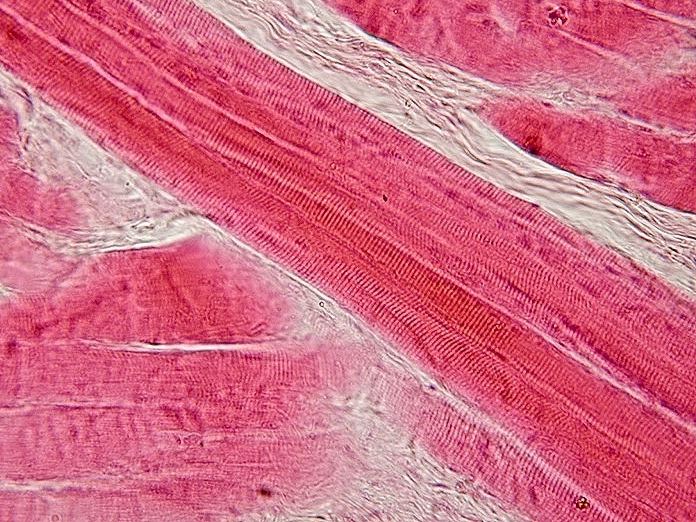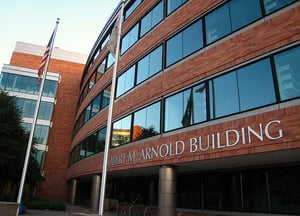
For cancer patients with tumors, there always a risk of the tumor spreading to a different organ, which makes fighting the cancer more difficult and risky. However, this spread of cancer very rarely occurs on skeletal muscles, which make up nearly 50% of body mass. Why don't these metastatic cancer cells move to and grow on these skeletal muscles? Researchers are still unclear. Now, with the help of a recent $1 million grant from the W.M. Keck Foundation, a research team at Fred Hutchinson Cancer Research Center will focus on studying this elusive topic. (Image courtesy of CC BY-SA 3.0 via Wikimedia Commons)
Read More
Tags:
Fred Hutchinson Cancer Research Center,
WA,
cancer research,
BioResearch Product Faire Event,
Seattle,
Hutch,
2017,
skeletal muscle research
Fred Hutchinson Cancer Research Center raised over $13 million in donations at its recent Hutch Holiday Gala, the center's largest annual fundraiser held in Seattle each year. Money from the event will be used to recruit world-class researchers in pediatric oncology and to expand research infrastructure geared specifically toward pediatric cancer research.
Read More
Tags:
Fred Hutchinson Cancer Research Center,
Washington,
WA,
cancer research,
Research Funding,
Seattle,
Northwest Region,
Cancer Center,
Fred Hutch
 DefeatHIV, an initiative based out of the Fred Hutchinson Cancer Research Center in Seattle, WA, has been researching potential cures for HIV over the past 5 years. Their research has focused on the use of blood cells genetically modified to be resistant to the HIV virus. It was recently announced that the National Institutes of Health (NIH) awarded the DefeatHIV team a new grant of $23.5 million that will continue to support their research on this potential cure for an additional 5 years.
DefeatHIV, an initiative based out of the Fred Hutchinson Cancer Research Center in Seattle, WA, has been researching potential cures for HIV over the past 5 years. Their research has focused on the use of blood cells genetically modified to be resistant to the HIV virus. It was recently announced that the National Institutes of Health (NIH) awarded the DefeatHIV team a new grant of $23.5 million that will continue to support their research on this potential cure for an additional 5 years.
Read More
Tags:
Fred Hutchinson Cancer Research Center,
WA,
Seattle,
Hutch,
2016,
BioResearch Product Faire,
HIV Vaccine,
HIV research,
DefeatHIV

Small-cell lung cancer (SCLC) makes up about 10 - 15% of all lung cancer diagnoses, and is caused by smoking and inhaling second-hand smoke. This is an aggressive type of cancer that spreads quickly, and recurs extremely frequently after patients undergo chemotherapy treatments. Treatments for SCLC have not changed much in the past 30 years, but a team of researchers led by the Fred Hutchinson Cancer Research Center in Seattle has been investigating potential new therapy methods for the cancer and recently uncovered a gene that has the potential to be used in biology-based treatments for SCLC. (Image courtesy of Lindsay Fox via Wikimedia Commons and EcigaretteReviewed)
Read More
Tags:
Fred Hutchinson Cancer Research Center,
WA,
cancer research,
Seattle,
Hutch,
2016,
Fred Hutch,
BioResearch Product Faire,
Western,
small-cell lung cancer,
L-Myc,
SCLC
 Millions of people suffer from allergies nationwide, (up to 30% of Americans, according to the Center for Disease Control), but for most, a healthy immune system and a course of antihistamines is all that is needed for a little relief.
Millions of people suffer from allergies nationwide, (up to 30% of Americans, according to the Center for Disease Control), but for most, a healthy immune system and a course of antihistamines is all that is needed for a little relief.
For others, however, diseases that complicate and degrade the immune system make every microbe and bacteria a potentially fatal nightmare. In recent years, people suffering from immune deficiencies have found some home in stem-cell transplants and other therapies, but their hope is tempered by inherent toxicities and associated side effects.
Read More
Tags:
Fred Hutchinson Cancer Research Center,
Washington,
immunotherapy,
Stem cell research,
WA,
NIH funded Research Projects,
Immune System,
grants,
2015,
BioResearch Product Faire Event,
Research Funding,
Stem Cell,
Seattle,
Northwest Region,
Hutch,
Fred Hutch
 Brain surgery is an extremely delicate matter, and complicated even further when performed on children with brain cancer. These cancer cells are difficult to discern from healthy cells during brain surgery and afterward may or may not still reside in the brain where they can continue to spread and cause damage.
Brain surgery is an extremely delicate matter, and complicated even further when performed on children with brain cancer. These cancer cells are difficult to discern from healthy cells during brain surgery and afterward may or may not still reside in the brain where they can continue to spread and cause damage.
Read More
Tags:
Fred Hutchinson Cancer Research Center,
Washington,
WA,
cancer research,
brain research,
2015,
BioResearch Product Faire Event,
Seattle,
Hutch
 Pancreatic cancer is one of the most rapidly spreading cancers known to man, which translates to seriously staggering death rates. According to the American Cancer Society, for all stages of pancreatic cancer combined, the one-year relative survival rate is 20%, and the five-year rate is 6%, in part because more than 80% of patient tumors have spread beyond the pancreas by the time of diagnosis. In most cases, the cancer has already spread to the point where surgical removal is impossible. (Image: Test Molecule; Los Angeles Mission College)
Pancreatic cancer is one of the most rapidly spreading cancers known to man, which translates to seriously staggering death rates. According to the American Cancer Society, for all stages of pancreatic cancer combined, the one-year relative survival rate is 20%, and the five-year rate is 6%, in part because more than 80% of patient tumors have spread beyond the pancreas by the time of diagnosis. In most cases, the cancer has already spread to the point where surgical removal is impossible. (Image: Test Molecule; Los Angeles Mission College)
Read More
Tags:
Fred Hutchinson Cancer Research Center,
Washington,
cancer research,
Cancer,
2015,
BioResearch Product Faire Event,
Seattle,
NIH funding,
Northwest Region,
Hutch,
cancer research funding
Researchers at Fred Hutchinson Cancer Research Center have discovered that high blood concentrations of omega-3 fatty acids increase risk of prostate cancers. The latest investigations indicate that high concentrations of EPA, DPA, and DHA, which are metabolically related to fatty acids and derived from fatty fish and fish-oil supplements, are associated with a 71% increased risk of high-grade prostate cancer and an overall 43% increase in risk for all prostate cancers.
Read More
Tags:
2014,
Fred Hutchinson Cancer Research Center,
WA,
Northwest,
BioResearch Product Faire Event,
Seattle,
Hutch
Fred Hutchinson Cancer Research Center recently received an $11 million life science research grant from the National Institutes of Health to fund the HIV Vaccine Trials Network. The organization within the NIH providing this latest round of life science funding is the National Institute of Allergy and Infectious Diseases. Project leader Dr. Margaret Juliana McElrath is a professor of medicine at the University of Washington. Her research lab studies are focused on identifying and characterizing cellular immune responses that may help protect patients against HIV infection or disease.
Read More
Tags:
2014,
Fred Hutchinson Cancer Research Center,
WA,
Northwest,
new research funding,
BioResearch Product Faire Event,
Seattle,
Hutch,
new grant
Researchers at the Fred Hutchinson Cancer Research Center have recently demonstrated that lacking one copy of a gene called CTCF causes mice to develop cancer. CTCF is a DNA binding protein that exerts a major influence on the architecture of the human genome. It has been well studied but never linked to cancer.
Read More
Tags:
2014,
Fred Hutchinson Cancer Research Center,
WA,
Northwest,
BioResearch Product Faire Event,
Seattle,
Hutch



 DefeatHIV, an initiative based out of the Fred Hutchinson Cancer Research Center in Seattle, WA, has been
DefeatHIV, an initiative based out of the Fred Hutchinson Cancer Research Center in Seattle, WA, has been 
 Millions of people suffer from allergies nationwide, (up to 30% of Americans, according to the Center for Disease Control), but for most, a healthy immune system and a course of antihistamines is all that is needed for a little relief.
Millions of people suffer from allergies nationwide, (up to 30% of Americans, according to the Center for Disease Control), but for most, a healthy immune system and a course of antihistamines is all that is needed for a little relief. Brain surgery is an extremely delicate matter, and complicated even further when performed on children with brain cancer. These cancer cells are difficult to discern from healthy cells during brain surgery and afterward may or may not still reside in the brain where they can continue to spread and cause damage.
Brain surgery is an extremely delicate matter, and complicated even further when performed on children with brain cancer. These cancer cells are difficult to discern from healthy cells during brain surgery and afterward may or may not still reside in the brain where they can continue to spread and cause damage.  Pancreatic cancer is one of the most rapidly spreading cancers known to man, which translates to seriously staggering death rates. According to the American Cancer Society, for all stages of pancreatic cancer combined, the one-year relative survival rate is 20%, and the five-year rate is 6%, in part because more than 80% of patient tumors have spread beyond the pancreas by the time of diagnosis. In most cases, the cancer has already spread to the point where surgical removal is impossible. (Image: Test Molecule; Los Angeles Mission College)
Pancreatic cancer is one of the most rapidly spreading cancers known to man, which translates to seriously staggering death rates. According to the American Cancer Society, for all stages of pancreatic cancer combined, the one-year relative survival rate is 20%, and the five-year rate is 6%, in part because more than 80% of patient tumors have spread beyond the pancreas by the time of diagnosis. In most cases, the cancer has already spread to the point where surgical removal is impossible. (Image: Test Molecule; Los Angeles Mission College)